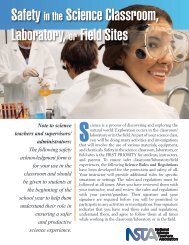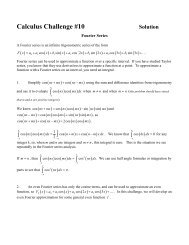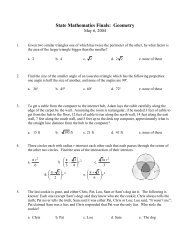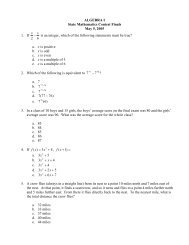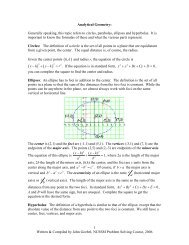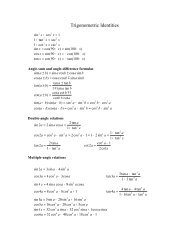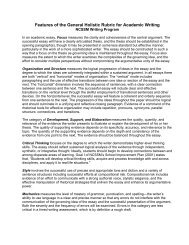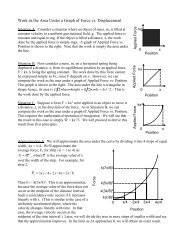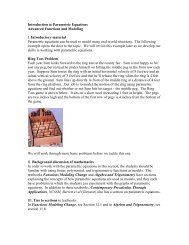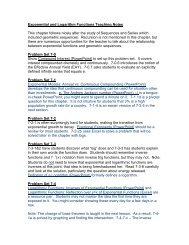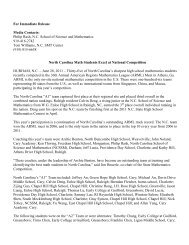NCSSM COURSE CAtAlOG - North Carolina School of Science and ...
NCSSM COURSE CAtAlOG - North Carolina School of Science and ...
NCSSM COURSE CAtAlOG - North Carolina School of Science and ...
Create successful ePaper yourself
Turn your PDF publications into a flip-book with our unique Google optimized e-Paper software.
activities include a group project, a paper linking IR theory with current events, a<br />
documentary viewing, discussions <strong>of</strong> current events, <strong>and</strong> other assignments.<br />
SS360 Topics in History <strong>and</strong> Social <strong>Science</strong><br />
One trimester<br />
Credit: One unit core elective credit.<br />
Prerequisite: Completion <strong>of</strong> at least two trimesters <strong>of</strong> AS303 Writing <strong>and</strong><br />
American Studies or AS305 American Studies.<br />
Meeting Pattern: Three periods per week including lab.<br />
This course focuses on a specific discipline or subject within the fields <strong>of</strong> history or<br />
social science. Students continue to hone the critical thinking skills they develop<br />
in their core required humanities courses, <strong>and</strong> they gain further practice in<br />
writing the academic essay. Content <strong>and</strong> methodology will change annually,<br />
based upon the topic for the academic year.<br />
SS362 Twentieth-Century Philosophy<br />
One trimester<br />
Credit: One unit core elective credit.<br />
Meeting pattern: Three periods per week including lab.<br />
This is a course on philosophy <strong>and</strong> its cultural context from 1840 to the present.<br />
We begin in the 1840s <strong>and</strong> 1850s with figures like Kierkegaard, who is perhaps<br />
the first philosopher to articulate the problem <strong>of</strong> existence <strong>and</strong> the possibility<br />
that life may be meaningless. Kierkegaard’s emphasis on choice <strong>and</strong> on faith<br />
contrasts markedly with a figure like Nietzsche, who proclaimed the death <strong>of</strong><br />
God <strong>and</strong> who interprets the concepts <strong>of</strong> choice <strong>and</strong> will in a sharply different<br />
way. Our work also involves examining the transformations in what Stephen Kern<br />
has called the “culture <strong>of</strong> time <strong>and</strong> space,” <strong>and</strong> how changes in views <strong>of</strong> the<br />
physical universe are reflected in Heidegger’s philosophy <strong>of</strong> being <strong>and</strong> time.<br />
Later in the trimester, we examine Adorno <strong>and</strong> Horkheimer’s analysis <strong>of</strong> the<br />
nihilistic elements in the legacy <strong>of</strong> the Enlightenment <strong>and</strong> their critique <strong>of</strong> the<br />
“culture industry,” along with Michel Foucault’s theory <strong>of</strong> power <strong>and</strong> its<br />
dynamics. Toward the end <strong>of</strong> the course, we read works like Judith Butler’s<br />
Gender Trouble <strong>and</strong> examine the social construction <strong>of</strong> gender. We also<br />
examine the philosophic novel <strong>and</strong> read works by Jean-Paul Sartre, Georges<br />
Bernanos, <strong>and</strong> Dostoevsky. Grades are based on a variety <strong>of</strong> reading<br />
commentaries <strong>and</strong> essays. Classes are organized like seminars <strong>and</strong> are<br />
discussion-based, with students <strong>of</strong>ten taking the lead on various philosophic<br />
topics.<br />
SS368 Introductory Sociology<br />
One trimester<br />
Credit: One unit core elective credit.<br />
26



